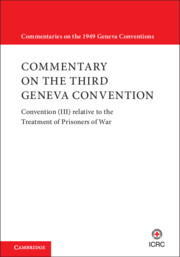 Commentary on the Third Geneva Convention
Commentary on the Third Geneva Convention from Chapter III - Hygiene and Medical Attention
Published online by Cambridge University Press: 21 August 2021
Article 30 elaborates on the medical attention that prisoners of warare entitled to receive. It specifies a number of measures the DetainingPower must take to fulfil its general obligation under Article 15 toprovide for the maintenance of prisoners of war, including the medicalattention required by their state of health.
To save this book to your Kindle, first ensure [email protected] is added to your Approved Personal Document E-mail List under your Personal Document Settings on the Manage Your Content and Devices page of your Amazon account. Then enter the ‘name’ part of your Kindle email address below. Find out more about saving to your Kindle.
Note you can select to save to either the @free.kindle.com or @kindle.com variations. ‘@free.kindle.com’ emails are free but can only be saved to your device when it is connected to wi-fi. ‘@kindle.com’ emails can be delivered even when you are not connected to wi-fi, but note that service fees apply.
Find out more about the Kindle Personal Document Service.
To save content items to your account, please confirm that you agree to abide by our usage policies. If this is the first time you use this feature, you will be asked to authorise Cambridge Core to connect with your account. Find out more about saving content to Dropbox.
To save content items to your account, please confirm that you agree to abide by our usage policies. If this is the first time you use this feature, you will be asked to authorise Cambridge Core to connect with your account. Find out more about saving content to Google Drive.